When it really boils down to it, you have two options with SEO:
- Hire a professional
- Do it yourself
Both options come with their own pros and cons, let’s start with hiring a professional:
The best thing about hiring a professional is the work gets done quickly, with minimal personal effort.
This makes it an excellent option for people that would rather spend their time elsewhere.
The biggest downfall is it can cost a lot of money, and dodging the sharks can be pretty tricky. There’s also a slight lack of control when hiring someone else to do the work, which isn’t for everyone.
The advantage of DIY SEO is the site owner has total control; this means they can get things done to their specifications and can save a lot of money. The downside is it takes a lot of time and research.
This article is going to focus on those that want to take on SEO for themselves and what they need to be focusing on.
Table of Contents
What Makes A Good SEO Strategy
For a perfect SEO strategy, four things must be considered for it to succeed. Failing to do so can cause serious problems.
- Build a foundation
- Research your keywords
- Onpage SEO
- Link building.
Using these four steps in this order is the best way to create an SEO strategy. No website can fail when these steps are executed flawlessly.
Let’s talk about them in more detail:
Building A Solid Foundation
The only way to know whether the foundations of the site are in good nick is by running a site audit.
The most common problems with a site are:
- Duplicate content
- Title tag issues
- Slow page speed
- Not mobile-friendly
Any of these issues can cause enough harm to the site to significantly decrease rankings and traffic. For this reason, these issues must be addressed.
Running a site audit can be achieved quickly and easily using one of the following tools:
Ahrefs
SEMRush
Website Auditor
All of these tools do a superb job at auditing sites, but for this demonstration will focus on Ahrefs:
Go to the main toolbar and click Site Audit.
Select “New Project” and enter the sites URL and fill in all the details-
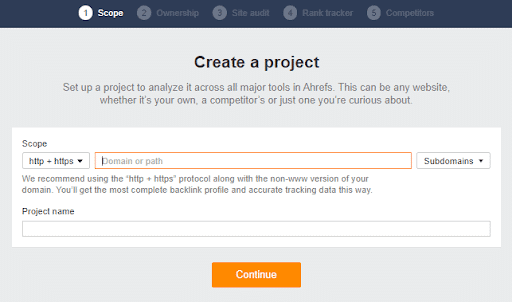
Set the tool to crawl the site
Once the crawl is finished, it will show the number of URLs it crawled, and the total health.
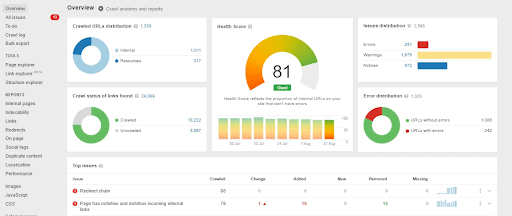
For any URLs that have issues, it will show the problem.
From there, it’s a case of working through the problems and making sure everything is running correctly.
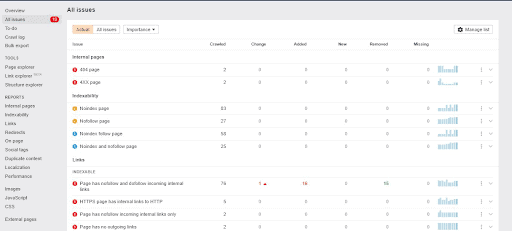
Once finished, re run the audit and make sure all the problems have been solved.
Then you are ready to move onto the next stage.
Keyword Research
Finding the right keywords for the business is the key to success. Keywords work as the bridge between a website and the search engine.
Without keywords, Google wouldn’t be able to recognize the relevance of websites.
The biggest mistake people make with keywords is picking them solely based on their search volume.
The key is to understand the intent of each keyword and what value it can bring the site. By understanding what, why and how to use keywords, you can give the website a boost.
There are 7 types of keywords as shown here:
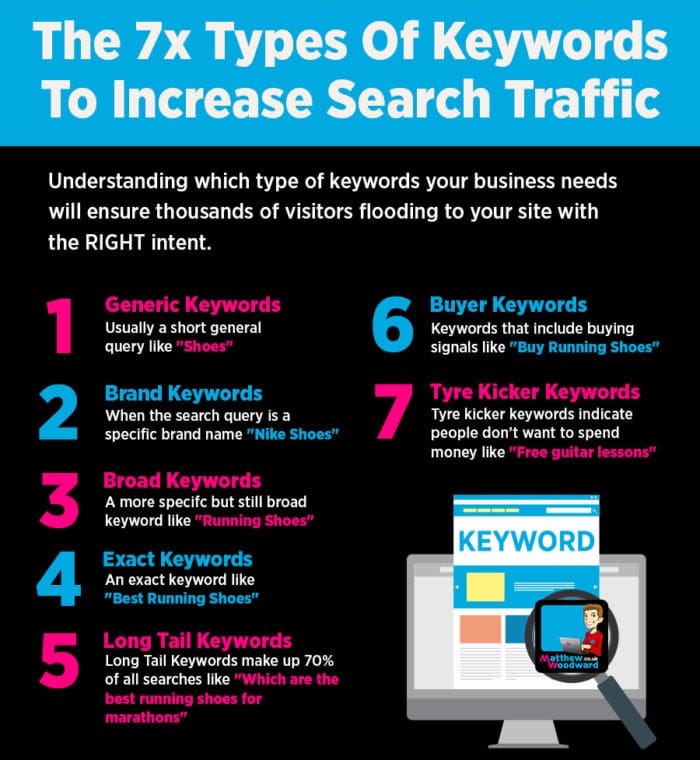
In general, people have more success with long-tail keywords, so let’s takes a more in-depth look into them:
Long-tail keywords tend to have a lower search volume but the highest conversion, making them a real money spinner.
When choosing a long-tail keyword you should have four things in mind:
- Intent – The keyword must drive people in at the right stage of the sales funnel
- Relevance – It needs to attract the right people to the page using a relevant keyword
- Competition – Can you realistically compete for this keyword?
- Search Volume – It needs to have enough people search the term to make it worth it
Having these four things in a keyword can significantly increase the chances of success.
To find keywords, tools like SEMRush are extremely handy.
SEMRush’s Keyword Magic Tool is great for keyword ideas, enter a seed keyword and receive thousands of relevant terms.
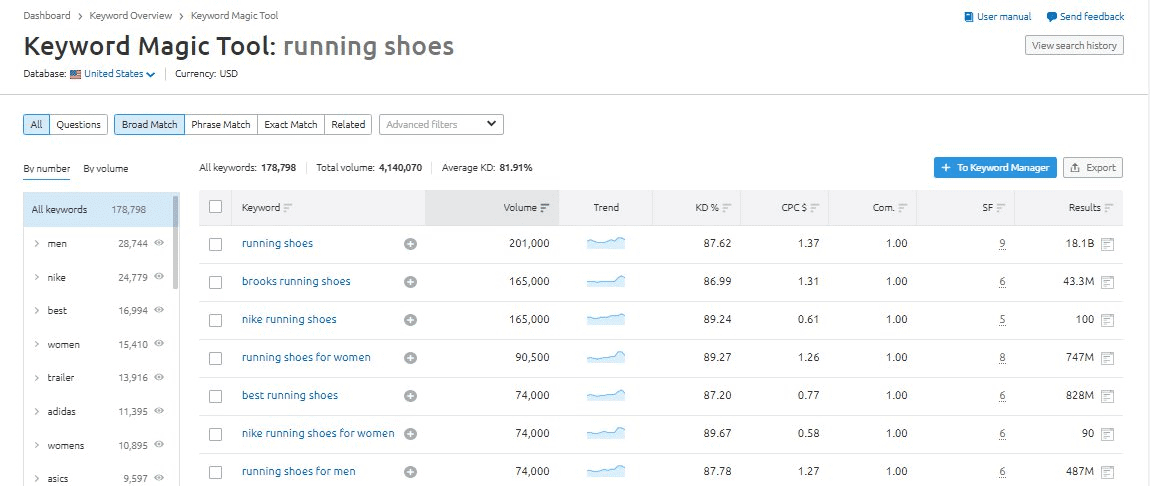
You can set filters to find low difficulty and high search volume keywords.
Then to do some further checks on your shortlist of keywords you can use their keyword overview tool to find a ton more data.
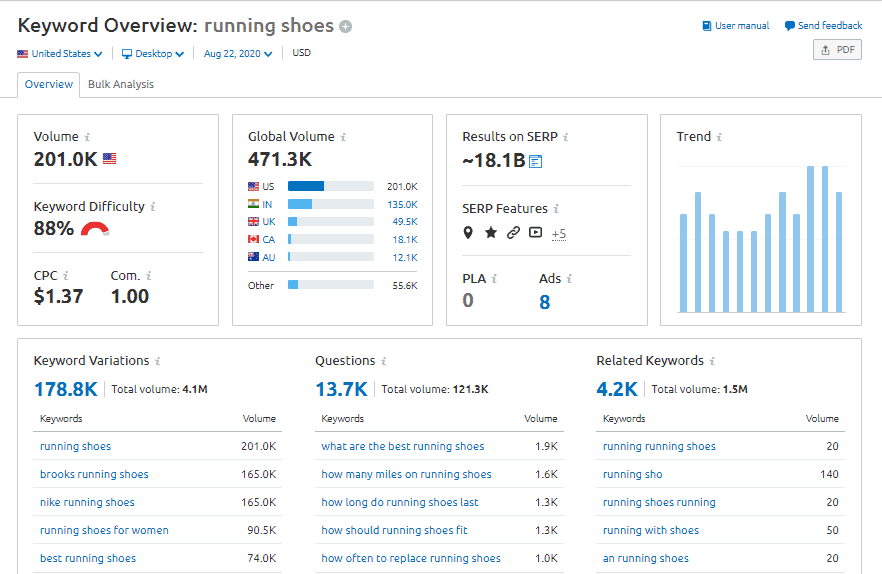
All this data can be exported if you prefer to analyze in excel.
SEMrush gives website owners the best chance of coming up with great keywords they can build a relevant content strategy around.
On-Page SEO
On-page SEO is the next step to implementing the perfect SEO strategy. It’s often an overlooked factor, but it shouldn’t be.
On-page SEO enhances the user experience of the site and helps Google understand what the page is about.
The best thing about on-page SEO is it’s:
- Super easy to do
- Completely free
Here are 5 of the most important SEO factors which can boost any site:
Website Speed
Without a fast loading website it can drastically reduce the amount of traffic the site gets.
Length Of Content
The more depth and information a page has the more Google likes it, thus pushing it up the rankings.
Internal links
Internal links help users navigate the site quickly and easily to other relevant information source.
Title Tag Starts With Primary Keyword
This helps Google and users understand what the page is about in the first millisecond.
Mobile Responsive
Most traffic comes from mobile device, if the site doesn’t work with mobile phones Google will rank it lower.
Link Building
Link building should be the last step in any SEO effort; without the rest in place, link building will have little effect.
Google has used links for over 20 years to determine the authority of a site. Without link building, no website can reach true success.
Google counts each link as a vote for the site, more votes they higher it ranks the website.

But it is important to note that links coming from relevant, high authority sites have a much bigger impact than links coming from low authority irrelevant sites. In some cases the latter can actually have a negative impact.
There are plenty of link building strategies people can take advantage of, but two of them stand out above the rest:
Guest Posting
It’s one of the most popular ways to score a link. SEO’s all over the world argue about whether guest posting is a white hat or black hat technique.
In the end, it doesn’t matter what side of the fence you sit on. Google has an algorithm, your job is to optimize your website to make the algorithm happy. So provided you are sensible about the websites you guest post for, you can use this technique really effectively to win some powerful links for your site.
Guest posting can be broken down into five simple steps:
- Finding the target
- Analyzing the blogs
- Reach out to them
- Create stunning content
- Build a rapport
Guest posting is harder than it used to be, so effort needs to be made to stand out.
Competitor Backlink Analysis
This strategy involves working smarter to use your competitors’ hard work (and links) against them.
They will be spending a lot of resources on link building. So rather than fighting against them, you can use their efforts to your advantage.
And when comparing the time spent vs links won, this actually one of the most effective techniques.
Backlink analysis can be broken into 4 steps:
- Make a list of the competitors in the organic search results for your chosen keyword.
- Run each competing URL through Ahrefs.
- Review the backlinks and look for high traffic + high authority referring sites.
- Try and replicate those links.
It really is as simple as that!
Wrapping Up
SEO isn’t hard; it’s simply a case of following a process. You just have to be able to commit the time.
This is why more people than ever are opting to hire a service to do the work for them.
Following the steps above will give any site the chance of success, and sometimes the smallest details can have the most significant results.










